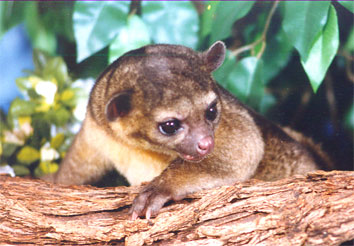|
A small tawny-colored rainforest animal sometimes called the honey bear. An adult weighs 5-6 pounds. Its coat is velvety, plush, soft, dense, and wooly, and sheds rain. Kinkajous are one of our favorite animals. If bottle-fed and handled properly at an early age they are very sweet And good natured, even when bonded to their owner(s),
they will go from person to person without hesitation, interacting with strangers just as with their owner.
Kinkajous are very quiet, odorless and inoffensive animals. They sleep all day and are very active at night.

The minimum size enclosure for a
kinkajou is 4'x8'x6' high. They live in trees in the wild so
provide plenty of strong branches or large soft rope to climb on.
Provide a wooden nest box
with a baby blanket inside or hang a ferret sleeping bag. Pine
Shavings makes an easily cleanable
substrate. If you live in a mild climate your kinkajou can be
kept outside all year if you provide a heat source for the cool
months. If you keep your kinkajou in a smaller enclosure such as a
large parrot cage, that is okay as long as you let your kinkajou
out to play several hours each evening.
Feed kinkajous fresh fruit
such as banana, grapes, papaya, mango, avocados, apples, pears,
and pears and vegetables such as carrot, broccoli, sweet potato,
celery, and corn. Each kinkajou is fed 8 to 10 Zupreem monkey
biscuits, a slice of wheat bread, and 4 raw peanuts a day. Give a daily
treat of graham cracker, fig newton , or a dried fruit such
as raisins, dates, or figs.
Hang a 16oz. or
larger water bottle on the outside of the cage.
When purchasing a
kinkajou, only purchase one that has been bottle-fed as a baby,
preferably from 4 weeks of age.
Lifespan in captivity
- up to 25 years.
Desired temperature -
75F to 85F.
|
